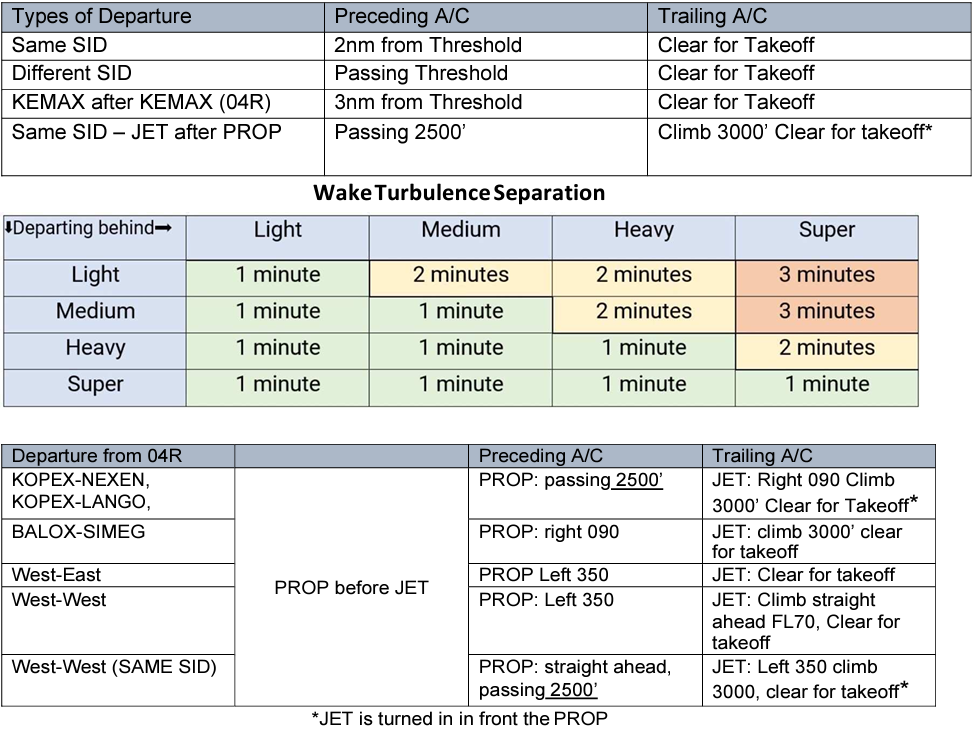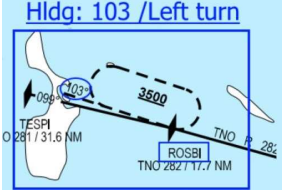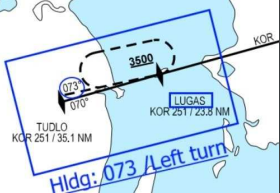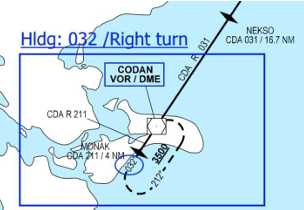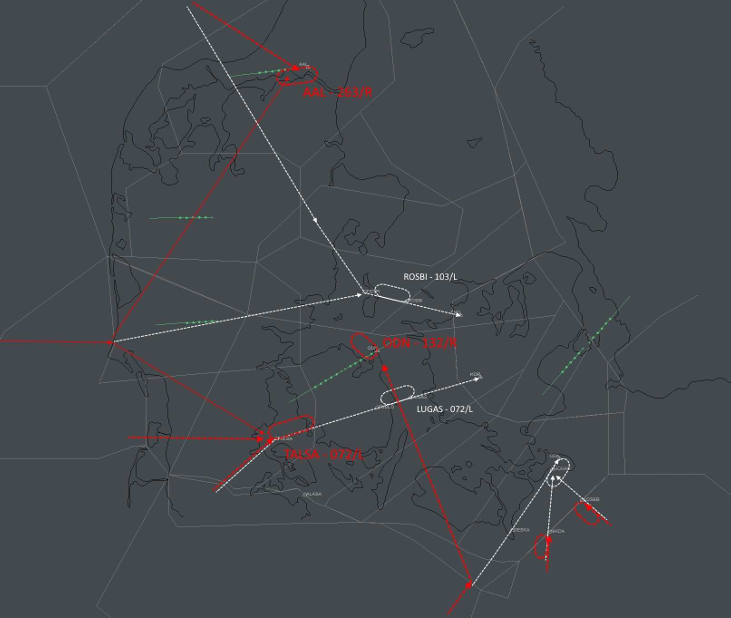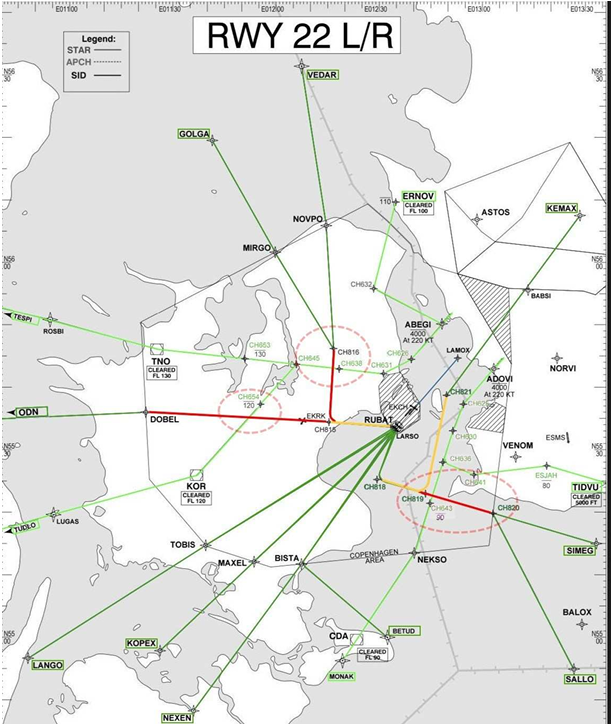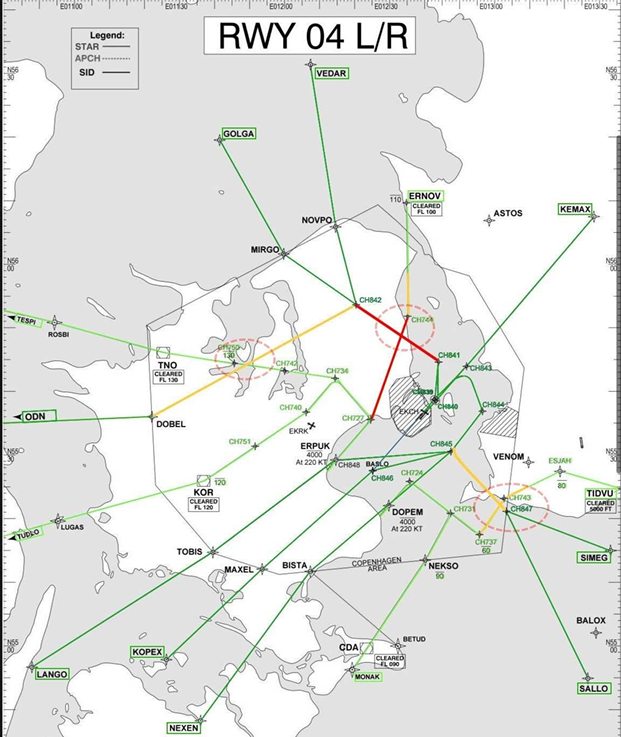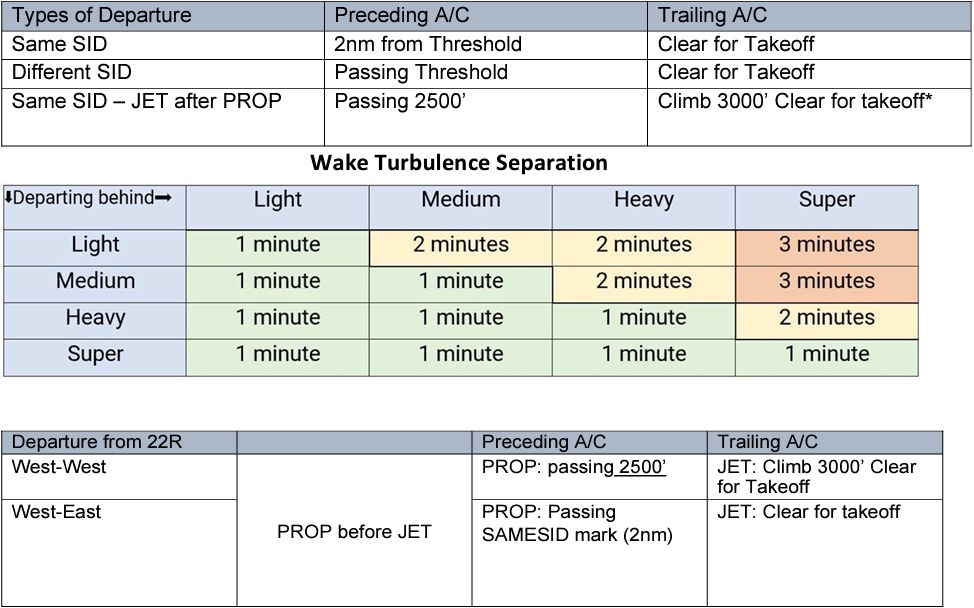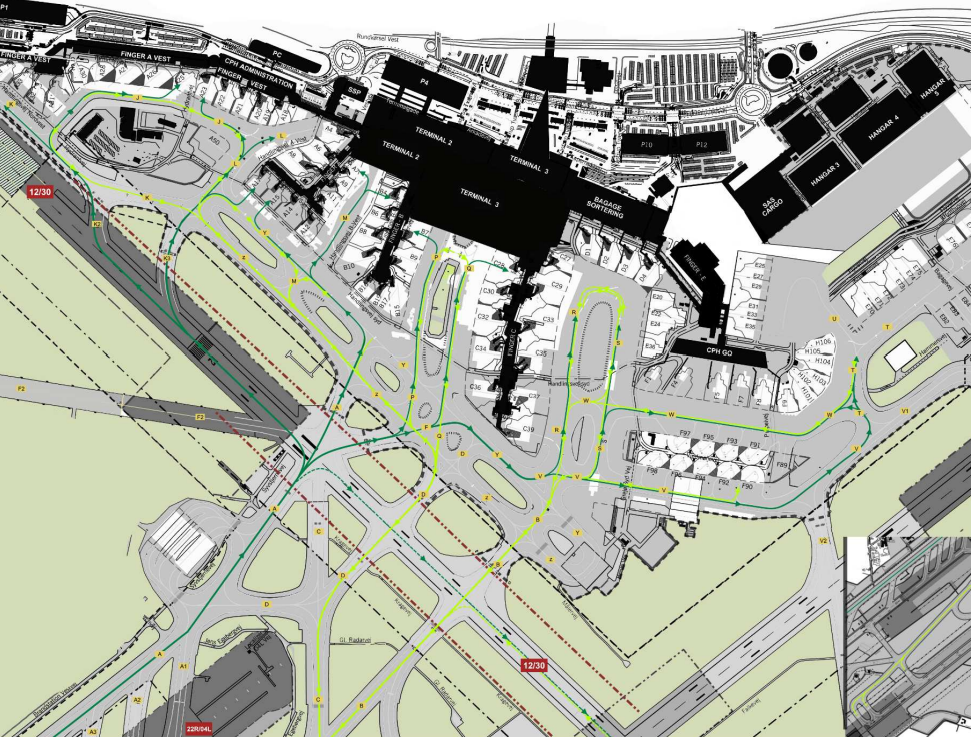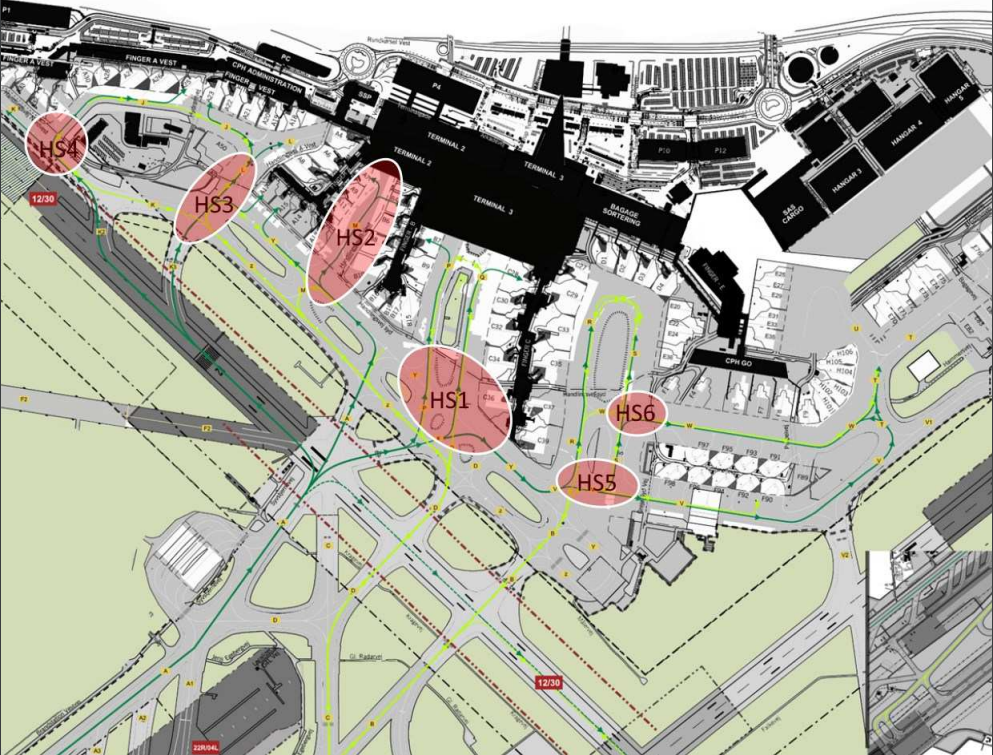RIU 04R/04L - TWR + GND
EKCH_A_TWR
- Familiarize yourself with Missed Approach procedure for the correct RWY!
- If getting RED conflicts, but it is clear the preceding will vacate before trailing touches down you are OK to continue. Issue TFC information with landing clearance
Standard missed approach procedure MUST be given ALWAYS unless coordinated otherwise.
Missed approach 04L
Left heading 347, climb 3000’
Handover to EKCH_W_APP 119.805
Missed approach should be announced as:
“Follow Standard Missed Approach procedure, Climb 3000”
Or if the pilot is struggling:
"GO AROUND! Left turn NOW heading 347 climb 3000 ft."
You should issue a Go- Around IF
- Separation is LESS than 2NM (Yellow Conflict sticker) while both aircraft are still on the ILS
- Aircraft will touch down before the preceding has vacated.
Only give Go Around if needed. Every go around is a big strain on APP/F_APP.
Correlation with EKCH_C_TWR
BE AWARE of this to ease congestion and workload for the next controller
| Taxi Route | For gates | Handover to |
| Via A cross RWY30 hold short Z | B4-B19 + A7-A15 | EKCH_C_TWR* (see below) |
| Via A cross RWY30 via F , Hold short Z | B7-B9 + All C,D,E,F | |
| Via A hold short RWY30 |
A4-A8 + A17-A34 |
EKCH_C_TWR |
Note that
- You can handover to EKCH_A_GND directly for traffic via A and F if coordinated and agreed to by EKCH_C_TWR
- You must handover before reaching de-icing platform for traffic to EKCH_C_TWR
If airplanes vacate E3/E2 by mistake, either:
- Hand over to EKCH_D_TWR or taxi down B after coordination, only if traffic allows
- Turn via B to E3/E2 and cross the arrival runway again if taxiing via B is not an option.
EKCH_D_TWR
- See Wake Turbulence and Route separation below
- Check scenarios for PROP before JET
- Preceding MUST be past the Threshold before the next DEP CLR is given
EKCH_C_TWR
ONLY use standard taxi routes unless coordinated with EKCH_A_GND
- K2+K3 are STANDARD for inbounds to A4-A34 (Not including A11-A15).
- DO NOT ask before using
- DO NOT accept wrong taxiways. Vacating B5 or missing C should still taxi up the runway for K3/K2 if needed. DO NOT overcrowd EKCH_A_GND
Coordinate as needed and desired with the two towers
As aircraft crosses Runway 30, they should as good as you can be separated into South vs. North departures
Assign a holding point for each aircraft to make TWR’s task easier.
- All WTC/H must use B1
- a WTC/M and smaller may use B3
- B4 only to be used upon pilot approval
- Use holding points to sequence traffic in north/south configuration.
- Handover to EKCH_D_TWR latest passing B4
- You control All regional airports (Except EKOD & EKSB)
- You are the coordinator with the overview and the guy with the big picture. Help!
- Review HOLDING CONTIGENCY. Be ready to help other ACCs!
Arrivals
Only Give the expected STAR!
| Arrival | Descend to | Next SCT |
| TESPI (all runways) | FL250 | EKDK_D_CTR (133.155) |
| TUDLO (all runways) | FL290 | EKDK_D_CTR (133.155) |
NOTE* MONAK arrivals do NOT come to you, but directly to EKDK_B_CTR from EDWW_B
Regional Airports inbounds
Coordinate with local ATC. If local ATC is online descend to as prescribed.
| Destination | Descend to | Directs available |
| EKYT | FL130 | BAKIT(26R)/GIPUG(08L)/AAL |
| EKBI | FL130 | GELBA/LOKSA (Final) GIVNA/UVINA (south) EPARA/ODNEV (north-base) |
| EKAH | FL70 | URUPA(28L) MOMZE(10R) TL |
| EKKA | FL130 | EBISO(09R from CH) (south base) RIKSU(27L from CH) (final) |
| EKSB | N/A (FL70 if from the West, 290 if from east) | LIBRI (32) / VIBEN (14) Propose direct to EKDK_D. |
| EKSP | FL70 | DINUT(28R) / TISET (08L) / VO |
EKDK_D_CTR
- Do not send aeroplanes into APP airspace on anything other than the cleared STAR with the required separation (specified below) unless specifically coordinated with EKCH_W_APP
- You need to ensure a Minimum of 15nm between arrivals on each STAR.
- If you cannot do this, you must start issuing holds.
- APP may ask you for other kinds of separation
- Keep an eye on ERNOV arrivals to ensure W_APP is not getting overloaded.
- 15nm/STAR=5nm average (3STARs) and W_APP needs to deliver with 7-10nm, so be ready to increase to 20nm or even 30nm between STARs if ERNOV has heavy inbound
- You control EKOD & EKSB
Arrivals
| Arrival | Minimum separation | Next SCT | XFL |
| TESPI | 15 nm (20 nm if other STARs are busy) |
EKCH_W_APP (119.805) | FL130 |
| TUDLO | EKCH_W_APP (119.805) | FL120 | |
| EKBI (09+27) | FL130 | EKDK_CTR / EKBI_APP | FL130 |
Ensure aircraft are reaching their altitude restrictions.
Departures
| SID | Climb to | Next ACC |
| GOLGA | FL240 | EKDK_CTR (136.485) |
| ODN | FL280 | EKDK_CTR (136.485) |
EKDK_B_CTR
- Do not send aeroplanes into APP airspace on anything other than the cleared STAR with the required separation (specified below) unless specifically coordinated with EKCH_E_APP
- You need to ensure a Minimum of 15nm between arrivals on each STAR.
- If you cannot do this, you must start issuing holds.
- APP may ask you for other kinds of separation
- Keep an eye on TIDVU arrivals to ensure E_APP is not getting overloaded.
- 15nm/STAR=7.5nm average (2STARs) and E_APP needs to deliver with 7-10nm, so be ready to increase to 20nm between STARs if TIDVU has heavy inbound
- If the hold is filed up, consider sending aeroplanes to D_CTR for TUDLO arrival if their traffic permits.
| Arrival | Initial descend | Next SCT | XFL |
| MONAK (22L) | FL100 Level by NEKSO |
EKCH_O_APP (118.455) | FL90 |
| MONAK (04L) | FL80 Level by NEKSO | EKCH_O_APP (118.455) | FL90 |
Do not use FL200 for holding to keep open for inbounds from NIKDA/KOSEB. If the holding is getting full above FL200, ask EDWW to do an en-route hold at NIKDA/KOSEB.
| SID | Climb to | Next ACC |
| NEXEN | FL280 |
EKDK_C_CTR (128.215) or EKDK_A_CTR (135.290) if none of these is online, to EKDK_CTR (136.485) |
| LANGO | ||
| KOPEX |
Holding Contingency
The holding Contingency Procedure is in effect when Holdings around ROSBI, LUGAS, and CDA get overloaded, and second-stage en-route holdings need to be taken into effect. ALL En-route holdings are assigned by EKDK_V_CTR (or C, S, N if online).
| Concerned ACCs | Arrival via | Contingency Procedure |
| EKDK_B_CTR | Via NIKDA/KOSEB to MONAK | Coordinate with EDUU to enter En-route holdings at NIKDA & KOSEB. Procedure direction discretion of EDUU |
| EKDK_CTR EKDK_B_CTR |
Via GESKA to MONAK | Coordinate with EDYY. Level off FL290, clear to ODN and enter ODN hold Descends only after reaching holding for separation with departing traffic via LANGO/NEXEN/KOPEX. Re-plan flight via TUDLO or TESPI as appropriate. |
| EKDK_CTR EKDK_C/A_CTR |
Via TALSA to TUDLO | Enter en-route holding at TALSA 072/L. Handover to EKDK_D, when released for Xhold, cleared to FL290 or Holding altitude whichever is lower |
| Via BAVTA to TUDLO | ||
| EKDK_CTR |
Via AAL to TESPI | Direct and enter en-route holding at AAL 072/L. Handover to EKDK_D, when released for Xhold, cleared to FL250 or Holding altitude whichever is lower |
| Via BAVTA to TESPI |
EKCH_W_APP
- Cleared no more than within 45 degrees of the Vector point
- If on an old AIRAC vector downwind on or outside of the Vector fix route
- Speed 200-230, or as agreed with F_APP
- Minimum average 7 - 10nm. If it starts getting difficult you must alert EKDK & ESMM
- If you need breathing room, ask EKDK to adjust flow to a minimum of 20nm between arrivals
- You get aircraft with an average minimum of 15nm between from ACC
You should NOT talk to EKCH_F_APP. He is the Silent partner.
Talk to EKCH_O_APP and coordinate spacing as well as possible.
Don’t be silent towards EKCH_O_APP. Make sure airplanes come in a nice string with the following criteria fulfilled.
Remember to:
- When transferring to EKCH_F_APP make sure they have 4000 and the correct speed as agreed upon
- Transfer by stating “Contact Final approach CALLSIGN ONLY 120.205”
- Transfer ideally before passing Abeam Airfield
- Keep the ACCs honest regarding minimum spacing
Handover to Final Approach
The handover to the Final approach is a sensitive subject and requires utmost care and coordination from either approach. The following procedures must be met when high-traffic loads are present:
Aircraft must be unless otherwise specifically requested by EKCH_F_APP via RTI:
- Cleared no later than the last point before the vector begins
- On average 7 - 10nm separated from other traffic, unless otherwise coordinated.
- If cleared to the last point before the vector begins the track MUST be within 45˚ of the vector to be followed, except for ERNOV2C arrivals
- If traffic cannot be within 45˚ of the vector, traffic must either be cleared to the waypoint before, or coordinated with F_APP
- SPD & ALT must correspond to the table below
| RWY | Altitude | Inbound | Speed |
| 22L/22R | 4000 MSL |
ABEGI / ADOVI or earlier | 200 - 230 knt. |
| 04L/04R | ERPUK / DOPEM or earlier | ||
| 12 | FEDJO / AGTIC or earlier | ||
| 30 | HUFO / COPHO or earlier |
All handovers to Final should be uttered with the condition «Callsign Only» «SAS42E, Contact Final, Callsign only, 120.205»
EKCH_F_APP may use the TAG and ROF TOPSKY functions to request specific headings and request frequencies for aircraft when desired.
EKCH_O_APP
- You get aircraft with an average minimum of 15nm between from ACC
- Cleared no more than within 45 degrees of Vector point
- If old AIRAC vector on downwind on or outside of Vector fix route
- Speed 200-230, or as agreed with F_APP
- Minimum average 7 - 10nm. If it starts getting difficult you must alert EKDK & ESMM
- If you need breathing room, ask EKDK/ESMM to adjust flow to a minimum of 20nm between arrivals
You should NOT talk to EKCH_F_APP. He is the Silent partner.
Talk to EKCH_W_APP and coordinate spacing as well as possible.
Don’t be silent towards EKCH_W_APP. Make sure airplanes come in a nice string with the following criteria fulfilled.
Remember to:
- When transferring to EKCH_F_APP make sure they have 4000 and the correct speed as agreed upon
- Transfer by stating “Contact Final approach CALLSIGN ONLY 120.205”
- Transfer ideally before passing Abeam Airfield
- Keep the ACCs honest regarding minimum spacing
- Caution climbing aircraft around ESJAH/NEKSO
Handover to Final Approach
The handover to the Final approach is a sensitive subject and requires utmost care and coordination from either approach. The following procedures must be met when high-traffic loads are present:
Aircraft must be unless otherwise specifically requested by EKCH_F_APP via RTI:
- Cleared no later than the last point before the vector begins
- On average 7 - 10nm separated from other traffic, unless otherwise coordinated.
- If cleared to the last point before the vector begins the track MUST be within 45˚ of the vector to be followed, except for ERNOV2C arrivals
- If traffic cannot be within 45˚ of the vector, traffic must either be cleared to the waypoint before, or coordinated with F_APP
- SPD & ALT must correspond to the table below
| RWY | Altitude | Inbound | Speed |
| 22L/22R | 4000 MSL |
ABEGI / ADOVI or earlier | 200 - 230 knt. |
| 04L/04R | ERPUK / DOPEM or earlier | ||
| 12 | FEDJO / AGTIC or earlier | ||
| 30 | HUFO / COPHO or earlier |
All handovers to Final should be uttered with the condition «Callsign Only» «SAS42E, Contact Final, Callsign only, 120.205»
EKCH_F_APP may use the TAG and ROF TOPSKY functions to request specific headings and request on frequencies for aircraft when desired.
EKCH_F_APP
- You must have a 7 - 10nm minimum average on handover from W/O_APP
- If you do NOT get that, tell them immediately!! Or you will get buried
- Consider putting on final before the vector-fix to avoid accidental base turn
- Standard separation on the final should be between 3-5nm, however, try to maintain a sharp 3 nm.
- Ensure 3nm or greater before handing it over to TWR
- If you are NOT able to sequence an aircraft in, turn it back to approach, for sequencing
Speed control within 10nm on the ILS must be EITHER:
180 until 6DME or 160 until 4DME
Dependent parallel operations: Minimum 2nm between arrivals on parallel runways.
Advise aircraft of the aircraft landing on parallel, and remember to transfer to the correct TWR
If the final gets 20nm or more, you need to enforce a complete approach stop! Do everything in your power to avoid this!!
EKCH_R_DEP (22R)
- Know the hotspots for departure crossing arrivals.
- Use caution before clearing A/C ABOVE FL70, due to arrivals
- Consider using Vectors and Directs to optimize flow. use TIP
| SID | Primary next sector |
| NEXEN / LANGO / KOPEX | EKDK_B_CTR |
| ODN / GOLGA | EKDK_D_CTR |
| VEDAR / KEMAX | ESMM_K_CTR |
| SIMEG / SALLO | ESMS_APP |
EKCH_R_DEP (04R)
- Know the hotspots for departure crossing arrivals.
- Use caution before clearing A/C ABOVE FL70, due to arrivals
- Consider using Vectors and Directs to optimize flow. use TIP
- Consider a right turn immediately for southbound. Give HDG as 185/175 to avoid confusion with cleared FL190
| SID | Primary next sector |
| NEXEN / LANGO / KOPEX | EKDK_B_CTR |
| ODN / GOLGA | EKDK_D_CTR |
| VEDAR / KEMAX | ESMM_K_CTR |
| SIMEG / SALLO | ESMS_APP |
EKCH_A_TWR (22L)
- Familiarize yourself with Standard taxi routes for INBOUND traffic
- Familiarize yourself with Missed Approach procedure for the correct RWY!
- Determine if you are responsible for VFR and/or Cargo Apron
- If getting RED conflicts, but it is clear the preceding will vacate before trailing touches down you are OK to continue. Issue TFC information with landing clearance
Standard missed approach procedure MUST be given ALWAYS unless coordinated otherwise.
Missed approach 22L
Left heading 187, climb 3000’
Handover to EKCH_O_APP 118.455
Missed approach should be announced as:
“Follow Standard Missed Approach procedure, Climb 3000”
Or if the pilot is struggling:
"GO AROUND! Left turn NOW heading 187 climb 3000 ft."
You should issue a Go- Around IF
- Separation is LESS than 2NM (Yellow Conflict sticker) while both aircraft are still on the ILS
- Aircraft will not be able to pass the threshold before the preceding has vacated.
Only give Go Around if needed. Every go around is a big strain on APP/F_APP
Correlation with EKCH_C_TWR
You should assign a stand for arriving aircraft, and send them via the correct taxiway as shown below.
BE AWARE of this to ease congestion and workload for the next controller
For arrivals via B and to cargo apron to hold short Z, DO NOT hand over to C_TWR. Handover directly to EKCH_A_GND, or keep yourself for cargo apron
EKCH_A_TWR (04L)
- Familiarize yourself with Standard taxi routes for INBOUND traffic
- Familiarize yourself with Missed Approach procedure for the correct RWY!
- Transfer cargo airplanes to C_TWR before Runway 12/30.
Standard missed approach procedure MUST be given ALWAYS unless coordinated otherwise.
Missed approach 22L
Left heading 347, climb 3000’
Handover to EKCH_W_APP 119.805
Missed approach should be announced as:
“Follow Standard Missed Approach procedure, Climb 3000”
Or if the pilot is struggling:
"GO AROUND! Left turn NOW heading 347 climb 3000 ft."
You should issue a Go- Around IF
- Separation is LESS than 2NM (Yellow Conflict sticker) while both aircraft are still on the ILS
- Aircraft will not be able to pass the threshold before the preceding has vacated.
Only give Go Around if needed. Every go around is a big strain on APP/F_APP
Correlation with EKCH_C_TWR
You should assign a stand for arriving aircraft, and send them via the correct taxiway as shown below.
BE AWARE of this to ease congestion and workload for the next controller
If airplanes vacate E3/E2 by mistake, either:
- Hand over to EKCH_D_TWR only if traffic allows
- Turn via B to E3/E2 and cross the arrival runway again
EKCH_D_TWR (22R)
| Northwest | Southwest | Southeast | West | North |
| KEMAX | LANGO NEXEN KOPEX |
SIMEG SALLO |
ODN | GOLGA VEDAR |
| Contact EKCH_DEP: 120.255 If EKCH_DEP is Offline then contact: |
||||
| EKCH_O_APP: 118.455 | EKCH_W_APP: 119.805 | |||
- see Wake Turbulence and Route separation below
- Check scenarios for PROP before JET
- Preceding MUST be past the Threshold before the next DEP CLR is given
EKCH_D_TWR (04R)
- see Wake Turbulence and Route separation below
- Check scenarios for PROP before JET
- Preceding MUST be past the Threshold before the next DEP CLR is given
EKCH_C_TWR
ONLY use standard taxi routes unless coordinated with EKCH_A_GND
- K2+K3 are STANDARD for inbounds to A4-A34 (Not including A11-A15).
- DO NOT ask before using
- DO NOT accept wrong taxiways. Vacating B5 or missing C should still taxi up the runway for K3/K2 if needed. DO NOT overcrowd EKCH_A_GND
Flights taxiing via B to hold short Z does NOT need you. A_TWR will Cross them directly.
As aircraft crosses Runway 30, they should as good as you can be separated into South vs. North departures
- SOUTH TURNS:
- NEXEN
- LANGO
- KOPEX
- SIMEG
- SALLO
- KEMAX
- NORTH TURNS:
- ODN
- GOLGA
- VEDAR
Assign a holding point for each aircraft to make TWR’s task easier.
Heavy Aircraft must be assigned A1/B1
EKCH_A_GND (04R/04L)
Make sure you know standard taxi routes & pushback routes
- Once handed from S_GND/DEL TSAT is out of the picture
- Adhere to proper use of Taxiway D
EKCH_D_GND
- Observe with split apron the Hotspots and how to manage without coordination
- Rule is, one controller has priority at a hotspot then the other controller taxies behind and the the first controller taxi as number three if more than two airplanes are at a hotspot
- EKCH_D_GND must observe no inbounds destined for that alley before commencing a pushback
- EKCH_A_GND must observe any ongoing pushbacks before taxiing into an alley
- HS1: Departure goes first onto D. Arrival holding short of Z goes as second. (NOTE different from 22R/22L)
- HS2: Arrivals must hold short Y and observe any ongoing pushback
- HS3: Arrivals on K3 must give way to first outbound and any subsequent blocking the ARR stand
- HS4: Departures from K must hold short J to give way to arrivals on K2.
- HS5: Departures from V must hold short of S to give way to first inbounds via K & R.
- HS5: Subsequent arrival should hold short of Y or Z to give way to beformentioned departure
- HS6: Departures from W must give way to first inbound at R & S

